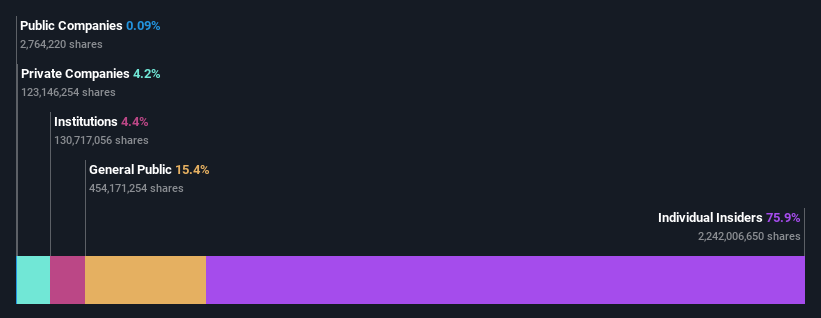GQG Partners Inc.'s (ASX:GQG) largest shareholder, Chief Investment Officer Rajiv Jain sees holdings value fall by 5.5% following recent drop
Key Insights
Insiders appear to have a vested interest in GQG Partners' growth, as seen by their sizeable ownership
Rajiv Jain owns 70% of the company
Ownership research along with analyst forecasts data help provide a good understanding of opportunities in a stock
To get a sense of who is truly in control of GQG Partners Inc. (ASX:GQG), it is important to understand the ownership structure of the business. We can see that individual insiders own the lion's share in the company with 76% ownership. Put another way, the group faces the maximum upside potential (or downside risk).
And last week, insiders endured the biggest losses as the stock fell by 5.5%.
Let's take a closer look to see what the different types of shareholders can tell us about GQG Partners.
See our latest analysis for GQG Partners
What Does The Institutional Ownership Tell Us About GQG Partners?
Institutional investors commonly compare their own returns to the returns of a commonly followed index. So they generally do consider buying larger companies that are included in the relevant benchmark index.
Institutions have a very small stake in GQG Partners. That indicates that the company is on the radar of some funds, but it isn't particularly popular with professional investors at the moment. If the business gets stronger from here, we could see a situation where more institutions are keen to buy. We sometimes see a rising share price when a few big institutions want to buy a certain stock at the same time. The history of earnings and revenue, which you can see below, could be helpful in considering if more institutional investors will want the stock. Of course, there are plenty of other factors to consider, too.
Hedge funds don't have many shares in GQG Partners. From our data, we infer that the largest shareholder is Rajiv Jain (who also holds the title of Chief Investment Officer) with 70% of shares outstanding. Its usually considered a good sign when insiders own a significant number of shares in the company, and in this case, we're glad to see a company insider play the role of a key stakeholder. Timothy Carver is the second largest shareholder owning 5.7% of common stock, and Northern Lights Midco, LLC holds about 4.0% of the company stock. Interestingly, the second-largest shareholder, Timothy Carver is also Chief Executive Officer, again, pointing towards strong insider ownership amongst the company's top shareholders.
While it makes sense to study institutional ownership data for a company, it also makes sense to study analyst sentiments to know which way the wind is blowing. There are a reasonable number of analysts covering the stock, so it might be useful to find out their aggregate view on the future.
Insider Ownership Of GQG Partners
The definition of an insider can differ slightly between different countries, but members of the board of directors always count. The company management answer to the board and the latter should represent the interests of shareholders. Notably, sometimes top-level managers are on the board themselves.
I generally consider insider ownership to be a good thing. However, on some occasions it makes it more difficult for other shareholders to hold the board accountable for decisions.
Our information suggests that insiders own more than half of GQG Partners Inc.. This gives them effective control of the company. That means insiders have a very meaningful AU$3.1b stake in this AU$4.0b business. It is good to see this level of investment. You can check here to see if those insiders have been selling any of their shares.
General Public Ownership
The general public, who are usually individual investors, hold a 15% stake in GQG Partners. While this size of ownership may not be enough to sway a policy decision in their favour, they can still make a collective impact on company policies.
Private Company Ownership
We can see that Private Companies own 4.2%, of the shares on issue. It might be worth looking deeper into this. If related parties, such as insiders, have an interest in one of these private companies, that should be disclosed in the annual report. Private companies may also have a strategic interest in the company.
Next Steps:
While it is well worth considering the different groups that own a company, there are other factors that are even more important. Consider risks, for instance. Every company has them, and we've spotted 1 warning sign for GQG Partners you should know about.
If you are like me, you may want to think about whether this company will grow or shrink. Luckily, you can check this free report showing analyst forecasts for its future.
NB: Figures in this article are calculated using data from the last twelve months, which refer to the 12-month period ending on the last date of the month the financial statement is dated. This may not be consistent with full year annual report figures.
Have feedback on this article? Concerned about the content? Get in touch with us directly. Alternatively, email editorial-team (at) simplywallst.com.
This article by Simply Wall St is general in nature. We provide commentary based on historical data and analyst forecasts only using an unbiased methodology and our articles are not intended to be financial advice. It does not constitute a recommendation to buy or sell any stock, and does not take account of your objectives, or your financial situation. We aim to bring you long-term focused analysis driven by fundamental data. Note that our analysis may not factor in the latest price-sensitive company announcements or qualitative material. Simply Wall St has no position in any stocks mentioned.
Join A Paid User Research Session
You’ll receive a US$30 Amazon Gift card for 1 hour of your time while helping us build better investing tools for the individual investors like yourself. Sign up here

 Yahoo Finance
Yahoo Finance 

